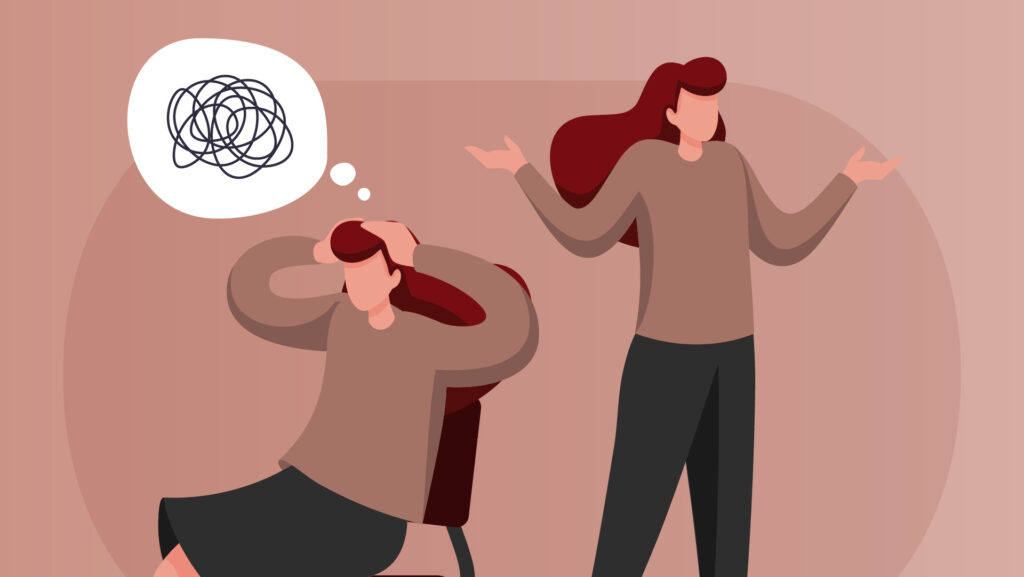Stress represents an inescapable part of life. As stress and well-being expert Donald Tubesing has observed, “Stress is like spice—in the right proportion, it enhances the flavor of a dish. Too little produces a bland, dull meal; too much may choke you.” When we feel equipped to handle stress it can help elevate our performance or encourage us to tackle new challenges. However, when stress overwhelms us, it can lead to feelings of anxiety and sickness.
One of the most common reasons people use weed is that it can ease stress and anxiety. As many as 72% percent of daily cannabis users turn to the plant to help them cope with stress. Fifty percent of medical cannabis users report that they rely on the plant to help alleviate anxiety. So, it’s clear that cannabis is a popular substance for managing symptoms of stress and anxiety, but does it actually help? Let’s find out.
What are anxiety and stress disorders?
There’s a close relationship between anxiety and stress. Stress represents the body’s internal response to an external trigger. Anxiety occurs when worries about an external stressor persist, even when that external source of stress is not present. Both stress and anxiety share many of the same symptoms: sleeplessness, difficulty concentrating, fatigue, muscle tension, irritability, digestive issues, and a racing heart, to name just a few.
Being stressed or feeling anxious from time to time is expected. Ongoing stress, however, can lead to the development of stress and anxiety disorders. People diagnosed with these disorders experience stress and anxiety in overwhelming or crippling ways, causing them to avoid common, everyday situations that may trigger their symptoms.
There’s a range of different stress and anxiety-related illnesses, but these are the main ones:
- Generalized Anxiety Disorder (GAD): Characterized by exaggerated worry and tension, even when there is little or nothing to provoke it.
- Obsessive-Compulsive Disorder (OCD): People living with OCD experience recurrent anxiety-provoking thoughts (obsessions) and/or repetitive behaviors (compulsions). Repetitive behaviors can include hand washing, cleaning, or checking locks, however, performing these so-called compulsions provides only temporary relief, and not performing them increases anxiety.
- Panic Disorder: Panic disorder leads to unexpected and repeated episodes of intense fear accompanied by physical symptoms. These symptoms can include chest pain, heart palpitations, shortness of breath, dizziness, or abdominal distress.
- Post-Traumatic Stress Disorder (PTSD): PTSD is an anxiety disorder that can develop after exposure to a terrifying event or ordeal. People with PTSD often avoid situations that can trigger the trauma, have trouble sleeping due to night terrors, or experience distressing flashbacks.
- Social Phobia or Social Anxiety Disorder (SAD): Social phobia is characterized by overwhelming anxiety and excessive self-consciousness in everyday social situations. Some individuals with social phobia may experience anxiety in a certain kind of situation, such as public speaking. The disorder can also be so broad that a person experiences symptoms whenever they’re around other people.
Does cannabis ease anxiety, or exacerbate it?
Personal experiences often yield contradictory findings when it comes to cannabis and anxiety. For some users, weed provides profound relaxation after a stressful day of work. For others, even a few quick puffs can provoke paranoia. These seemingly irreconcilable experiences hint at a nuanced truth—cannabis can both ease and exacerbate anxiety. Cannabinoid concentration, dose, and terpenes may all influence whether the plant kicks off a panic attack or ushers in a state of chilled-out bliss.
The role of cannabinoids
Most research exploring the effects of cannabis on anxiety and stress focuses on the two main cannabinoids present in cannabis, CBD and THC. Studies suggest that CBD can soothe anxiety and stress. THC research, on the other hand, shows that the intoxicating cannabinoid can cause anxiety, especially when taken in large doses.
However, survey data also suggests that combining these two cannabinoids can produce different effects. For example, real-life cannabis users appear to generally favor whole-plant cannabis for helping promote relaxation. Whole plant formulations typically have a higher ratio of THC to CBD. Other research has also shown that when CBD is administered alongside THC, CBD appears to block the anxiety-provoking effects of THC.
As we learn more about minor cannabinoids, it’s increasingly clear that they may also play a role in relieving stress. One recent study found that THCA, THCV, and CBG all positively impacted anxiety. However, the knowledge we have of these minor cannabinoids is mainly based on test-tube and animal studies. Studies on human populations are needed to help us understand their effects on anxiety better.
Dosage is important
Dose additionally plays a significant role in how cannabis works on anxiety, particularly when it comes to THC. THC is very dose-dependent. Experts believe a biphasic interaction with the CB1 receptor in the body is mainly responsible, meaning that low and high doses of cannabis exert different effects on the consumer.
High quantities of cannabis appear to ramp up anxiety. In a review of human studies, participants often share that they feel increasingly tense and jittery with increases in THC dose. These effects are more pronounced among infrequent or non-users rather than those who use THC frequently, such as on a daily or weekly basis.
However, some of those studies have also demonstrated that THC can diminish anxiety and stress when administered at lower doses. The benefits may be gained by starting with a super low dose of THC and gradually increasing until optimal effects are reached.
CBD also appears most effective in easing anxiety at low doses. However, unlike THC, CBD doesn’t seem to exacerbate stress, anxiety, or paranoia in higher amounts.
While the jury is still out on the ideal dose of THC or CBD to alleviate anxiety, clinical studies have indicated some ballpark figures. For example, one 2022 review found that participants showed improvements in anxiety levels after single doses of CBD ranging from 300 to 600 mg.
The same review reported that up to 3 mg of THC per day reduced symptoms among individuals diagnosed with an anxiety disorder over a month, although these individuals had very mild symptoms.
Terpenes and the entourage effect
Teaming cannabinoids with other beneficial terpenes found in cannabis may also help promote a sense of calm and relaxation. Increasingly, research indicates that terpenes may play an influential part in activating the anti-anxiety properties of the plant. The combined effect of these compounds creates a beneficial synergy known as the entourage effect, contributing to the relaxing, uplifting properties of the plant.
D-limonene and linalool, in particular, have been shown to exert significant anxiety-relieving activity. D-limonene has a refreshing, citrusy, sweet scent, similar to the aroma found in citrus rinds.
Linalool is known for its complex, woodsy, floral fragrance. Research suggests that linalool exerts its relaxing, uplifting properties via the 5-HT1A receptor, a serotonin receptor. Antidepressants and anti-anxiety medications also partially exert their effects by activating this receptor. Other terpenes such as myrcene, caryophyllene, linalool, and pinene are also associated with anti-anxiety benefits.
Can cannabis trigger the onset of an anxiety disorder?

Researchers agree that we need more robust clinical data to understand how cannabis use affects anxiety disorders. A recent 2021 review examined the available data, checking whether there was evidence across a range of studies that cannabis might contribute to the onset of an anxiety disorder or if specific cannabinoids could help in its treatment.
The review authors explored the findings of 47 high-quality studies and found that cannabis was not a clear risk factor for the onset of anxiety disorders such as generalized anxiety disorder, social anxiety disorder, or panic disorder. The only exception they encountered was PTSD.
Preliminary evidence suggested that cannabis use could increase the odds of individuals who had been exposed to trauma developing PTSD. However, the authors also stressed that the findings were only apparent in a small population, so would need to be replicated in a larger study.
Can cannabis help treat anxiety disorders?
The authors of the review also reported that CBD may be helpful in the treatment of social anxiety disorder, based on the findings of a significant study. A single 600mg dose of CBD helped students with SAD to dramatically reduce anxiety, mental blocks, and discomfort in their speech performance. Other preliminary research in the review pointed to the usefulness of nabilone, a synthetic form of THC, for the treatment of night terrors associated with PTSD.
It’s worth pointing out that many states in the US that have legalized medical marijuana accept PTSD as a qualifying condition for cannabis prescriptions.
In addition, a 2022 clinical study that followed 150 participants over a year (a relatively large sample) found that those who used cannabis saw a more significant reduction in their PTSD symptoms than those who didn’t. Cannabis users were also 2.57 times more likely to recover from PTSD during the study than those who weren’t using weed.
Even though robust clinical research may be scarce, surveys suggest that many individuals are already using cannabis to treat their anxiety disorders anyway. For instance, one study of 2032 people found that nearly half of the respondents had substituted an anxiety medication prescribed by their physician with medical cannabis. Sixty-one percent indicated that cannabis had completely replaced their prescribed medication.
Another study consisting of 1513 participants found similar results, with 71.8% revealing that they had lowered their intake of anti-anxiety medications since using cannabis.
Tips for using cannabis to manage anxiety or stress
As the above findings suggest, many cannabis consumers already rely on the plant to help manage anxiety symptoms.
If you’re planning on trying cannabis or certain cannabinoids to ease anxiety or stress, talk to a physician or expert specializing in cannabis medicine first. While the right combination of cannabinoids and terpenes delivered in the ideal dose can help with relaxation, THC-rich weed may cause the opposite effect. Follow the old adage of “start low, go slow,” and explore how different combinations of cannabinoids and terpenes make you feel.
Finally, it’s critical to be aware that unwanted effects can happen if you combine anti-anxiety medication such as SSRIs with weed. These interactions take place because many drugs work via the same enzyme pathways in the liver as cannabis.
CBD in particular can interfere with these enzyme pathways, altering how SSRIs behave in the body. Those who take SSRIs and add THC or CBD to the mix are at risk for heightened SSRI side effects. Patients who already take THC or CBD with SSRIs may notice changes if they cease cannabis use, as the cannabinoids can decrease the concentration of SSRIs in the bloodstream.
By submitting this form, you will be subscribed to news and promotional emails from Leafly and you agree to Leafly’s Terms of Service and Privacy Policy. You can unsubscribe from Leafly email messages anytime.

